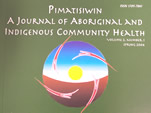A paper by Derek Jennings and John Lowe
Children’s voices and their perceptions of healthy behaviours have been argued as critical for understanding health policy and program design that affect them (Mcwhirter et al., 2000; Nic Gabhainn and Sixsmith, 2006). This study was conducted to elucidate and define the concept of health among Indigenous children in their own dynamic environment, which remains an ever-evolving culture. Through the use of photographic research methodology, middle-school children among one Indigenous (Native American) tribe defined their concept of health by taking photographs in their environment utilizing photovoice methods. The participants remained actively involved in the study as they assisted in consolidating and organizing their ideas. The location of each photograph was identified along with the environmental attributes depicting the location as healthy, unhealthy, or both. Findings were presented to tribal community leaders and stake holders to inform childhood health programs and policies. The findings indicate a complex, evolving, and culturally relevant idea of health that is tied to the current cultural environment in which Indigenous (Native American) children and their families live.
The paper is freely available through the Open Access Journal Pimatisiwin HERE

